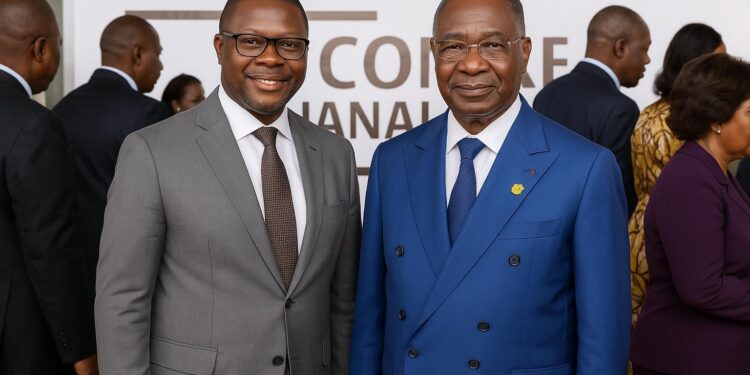High-Level Gathering in Kintélé
At the Grand Hotel of Kintélé, a riverside complex outside Brazzaville, the National Health Council convened its second ordinary session, four decades after inception, under the chairmanship of Prime Minister Anatole Collinet Makosso, signalling renewed governmental attention to strategic health governance.
The meeting, structured around an opening, expert workshops and a plenary vote, assembled fifteen ministers, prefects, departmental health leaders, technical partners and researchers, creating a rare arena where political authority met frontline evidence.
Governance at the Heart of SDG 3
Choosing the United Nations Sustainable Development Goal 3 as conceptual frame, organisers stressed that resilient and equitable systems demand governance reforms as much as medical supplies, echoing World Health Organization guidance that stewardship, transparency and accountability shape health outcomes as decisively as epidemiological trends (WHO country brief 2024).
Prime Minister Makosso’s keynote declared health “the first of all battles”, linking improved coverage to macroeconomic stability, investor confidence and national cohesion, a discourse consistent with regional statements delivered at the African Union summit in Addis Ababa earlier this year (AU communique, February 2025).
Closing the Financing Gap
Finance Minister Ingrid Olga Ghislaine Ebouka-Babackas presented preliminary estimates indicating that Congo allocates close to 9.2 percent of public expenditure to health, slightly below the Abuja target, yet well above several regional peers, arguing that innovative levies on mobile money and extractive royalties could close the remaining resource gap.
Development partners led by the World Bank and French Development Agency welcomed the plan, noting that blended finance had expanded community programmes in Rwanda and Ghana, yet they urged legal clarity to guarantee predictability and domestic ownership.
Decentralisation and Human Capital
The most animated exchanges revolved around human resources and decentralisation. Delegates from Sangha and Kouilou departments underscored persistent shortages of specialised staff outside urban centres, while union representatives advocated a territorial civil service statute to facilitate rural deployment and merit-based career paths.
The council therefore endorsed pilot agreements transferring management of primary facilities to local authorities, paired with performance contracts and digital dashboards, a model inspired by Senegal’s health districts. Prefects welcomed the prospect, yet requested capacity-building envelopes to assume new fiduciary responsibilities without jeopardising service continuity.
Infrastructure and Technology Leap
Hardware still matters. Minister of Health Jean-Rosaire Ibara catalogued recent achievements, including the general hospitals of Brazzaville and Pointe-Noire and 327 rural posts renovated since 2021, while announcing imminent commissioning of modern facilities in Ouesso and Sibiti, projects jointly audited by the African Development Bank.
Equipment upgrades dominate the recommendations, with digital radiology, solar cold chains and telemedicine prioritised. The International Telecommunication Union, piloting broadband along the Congo-Ocean railway, is keen to align connectivity schedules with Health Ministry plans for data integration.
International and Regional Implications
From a diplomatic standpoint, the session demonstrated Congo-Brazzaville’s willingness to align domestic policy with multilateral frameworks, reinforcing its candidature for a rotating seat on the WHO Executive Board in 2026. “Delivering on SDG 3 at home strengthens our voice abroad,” an official from the foreign ministry observed.
Regional observers noted that robust health governance can mitigate transboundary threats such as Ebola and measles, thereby complementing Central African peacebuilding initiatives. The Economic Community of Central African States signalled readiness to streamline cross-border surveillance protocols with Congo’s new digital health architecture once operational.
Timetable Toward Universal Coverage
The final communique lists a timeline: draft decree within sixty days, financing strategy by December, pilot decentralisation contracts before mid-2026, and an independent progress review each July. Officials emphasise that the matrix will be integrated into the National Development Plan to guarantee interministerial follow-up.
Experts caution, however, that monitoring indicators must capture equity, not only aggregate coverage. “Averages mask disparity,” warned Professor Henri Ossété from Marien Ngouabi University, urging geocoded dashboards and gender-disaggregated data to ensure that riverine and forest communities benefit proportionally from future budget increases.
Voices from Stakeholders
In the lobby, civil society delegates voiced guarded optimism. Rosalie Mampouya, a patient advocate, praised the open microphone format, saying the tone felt “less top-down than in 2022”, yet she still demanded formal seats for non-state actors.
Private-sector representatives, particularly from oil and telecommunications firms, signalled willingness to join public-private partnerships, yet requested clearer tax incentives and reduced customs delays for imported medical equipment, considerations the finance ministry promised to examine before the national budget debate in Parliament this October.
Risks and Mitigation Strategies
Implementation nonetheless faces structural constraints. Commodity price fluctuations can compress fiscal space, and heavy rains routinely damage feeder roads that supply clinics with vaccines. Government planners are therefore integrating climate-resilient logistics corridors into the forthcoming Health Infrastructure Masterplan, with technical support from the World Food Programme.
Success will ultimately hinge on sustained political commitment. By revamping the council’s legal basis and embracing participatory oversight, Brazzaville seeks to reassure citizens and partners that universal health coverage is not rhetorical ambition but a deliverable milestone on the Republic’s socioeconomic journey toward 2030 and beyond.












































